
In a bold move that might reshape the landscape of international trade, former President Donald Trump has put forth a plan focused on implementing tariffs against Mexico, Canada, and China. This aggressive strategy raises significant questions about its implications for businesses, consumers, and the broader economy. As tensions simmer, stakeholders from various sectors are preparing for potential disruptions that may linger long after the tariffs are enacted.
The rationale behind these tariffs, as articulated by Trump, revolves around protecting American jobs and addressing what he categorizes as unfair trade practices. Proponents believe that a tactical imposition of tariffs would provide a protective barrier for domestic industries struggling to compete against foreign imports. However, critics argue that such measures could lead to higher prices for American consumers and retaliatory actions from trading partners, which could spiral into a full-blown trade war.
In examining the specifics of Trump's tariff proposals, discussions often center around the automotive industry, agriculture, and the technology sector. These industries could potentially face significant repercussions from the implementation of tariffs. The automotive sector, particularly, relies heavily on just-in-time supply chains that cross international borders. A sudden increase in costs could jeopardize manufacturing firms and lead to job losses—an outcome starkly opposed to the intention behind the tariffs.
Meanwhile, agriculture is poised to bear the brunt of retaliatory tariffs from nations like Mexico and Canada. American farmers who heavily depend on exports may find themselves at a disadvantage in foreign markets if tariffs stifle trade flow. The fear of retaliatory tariffs could also deter investment into the agricultural sector, complicating an already strained situation exacerbated by climate change and other environmental factors.
The dynamic with China comes laden with potential volatility. China, as one of the largest trade partners of the United States, plays a pivotal role in the global supply chain. The ongoing chip crisis and the dependence of various tech industries on Chinese manufacturing complicate the trade narrative. Should tariffs push Chinese manufacturers to seek markets elsewhere or develop alternative supply routes, American companies could face shortages, increased production costs, and enhanced competition in the global arena.
Moreover, consumer reactions to these tariffs cannot be overlooked. Should costs rise due to tariffs, consumers might notice increases in the prices of everyday goods, leading to discontent and a subsequent shift in purchasing behavior. This scenario could disrupt numerous retail businesses and potentially lead to a contraction in economic growth, counteracting the favorable job creation that the tariffs aim to bolster.
International diplomatic relations occupy another crucial aspect of this situation. The effects of tariffs might extend beyond economic ramifications to affect political ties. Strained relations with trading partners can influence alliances and negotiations on broader global issues, including climate change and security apparatuses.
As stakeholders await the finalization of these tariff strategies, the uncertainty surrounding domestic and international markets remains palpable. What will the ultimate fallout be? Are the potential benefits worth the gamble of sparking a trade war that may escalate beyond initial projections? As analysts and economists mull over these questions, their conclusions could dictate not just the trajectory of the American economy but also signal the future of global trade relationships.
In conclusion, while Trump's tariffs aim to safeguard American interests, the unintended consequences loom large. The balance between protectionism and open trade is delicate, and the forthcoming months will reveal whether this bold approach can deliver promised outcomes or trigger an economic landscape fraught with challenges.
#TrumpTariffs #TradeWar #Mexico #Canada #China #Economy #InternationalTrade #ConsumerImpact #Agriculture #AutomotiveIndustry
Author: Laura Mitchell




